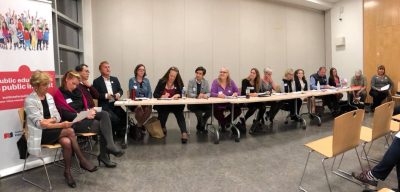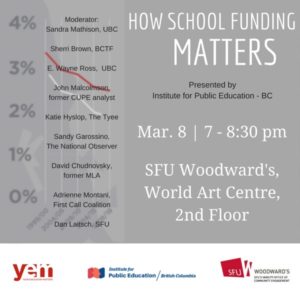IPE/BC Fellows hold a range of views and interests relative to public education. Perspectives is an opportunity for Fellows to share their ideas in short, accessible essays.
How GERM is Infecting BC Public Education
By E. Wayne Ross
The Institute for Public Education BC is committed to public education for the good of all children, families and communities and this is reflected in its tag line, “public education is a public interest.”
This proposition may seem obviously true, but it’s not.
Public education in British Columbia, across Canada, and globally faces serious challenges when it comes to serving the common good. Over the last half century, the dominant world view has privileged the individual over the well-being of the general public.
This view and the policies that flow from it are referred to as “neoliberalism.” Governments across the political spectrum, both the politically conservative and liberal, share belief in the major tenets of neoliberalism, including fiscal austerity, privatization of public goods and services, government deregulation, and free trade.
In education, neoliberalism is manifest in what Finnish educator Pasi Sahlberg has dubbed the Global Education Reform Movement (GERM), which:
- prioritizes and imposes a business model on public education;
- increases competition among students, teachers and schools (test-based accountability; performance-related rewards; league-tables; attacks on teacher unions);
- supports an audit and accountability culture that takes education out the hands of teachers, students, and the public;
- commodifies education via “school choice,” which positions students and parents as consumers in an education marketplace;
- promotes the privatization and marketization of public schools (education becomes a service sector open to trade and investors; off-shore schools; and selling seats in schools and universities on the international market);
- sees public education as an opportunity to maximize human capital (i.e., a narrowly educated workforce) as opposed to maximizing the common good and social cohesion.
These reforms are backed by many governments as well as The World Bank, International Monetary Fund, and Organization of Economic Cooperation and Development (OECD).
Despite rhetoric linking GERM to benefits for all within the vast constituency of public education, the fact is that those who regulate both knowledge and the economy work for their own political and economic agendas, acting as though the public extended no farther than their privately secured office buildings and comfortably gated communities.
GERM in British Columbia
GERM has infected public education in British Columbia and the symptoms are obvious.
- School closures – In the past 15 years, over 200 public schools have been closed in BC.
- Government destruction of agreed upon guidelines on class size and composition, which have had deleterious effects on learning and teaching conditions.
- Reduction in the number of teachers, teacher-librarians, and classroom aides. Educators in BC are responsible for more children on average, than educators in the rest of Canada, a gap that is widening.
- Selling school and universities seats on international market has become a major source of income growth for schools and universities in BC.
- Off-shore schools – BC public school districts have been encouraged to create private business companies that are owned by school boards and operate to sell education overseas.
- An estimated $5 billion in deferred maintenance for school buildings.
- School rankings that oversimplify the characteristics of good schools; commodify education; and rely primarily on standardized test scores, which advantage schools with students from wealthy families.
- Commercialization – Corporate incursion into schools that encourages competition; injects corporate advertising, exploiting underfunded schools.
- Expansion of private tutoring companies, many of which are owned by international corporations.
- British Columbia now spends $1000 less per student than the Canadian national average.
- Reduction in government spending on public education. In 2001, the BC government put 20% of its total spending into education, now it spends just 11.8% of its budget on education.
- Reliance on parent fund-raising via Parent Advisory Committees; it is estimated that parents now spend $132 million yearly in subsidies to public education.
Examining BC education funding trends, we can see how neoliberal education policies shift social costs on to individuals. These same trends can be found in other public services such as the health care and transportation.
At the same time, the BC government gives public money to subsidize private schools, many of which serve the rich and charge thousands of dollars in tuition.
Public Funding of Private Education is Undemocratic
Public funding for private schools is at odds with creating a more equitable, just, and democratic society.
It is a policy that almost always privileges families with more disposable income over the less wealthy and poor, and often privileges religious education over secular education. Moreover, public funding of private schools supports a two-tiered system of education that allows some schools to cherry-pick who attends, and undermines the concepts of the public good and community in favour of individual gain.
Public-school budget cuts result in closed libraries, reduced special-education services and increased class size, while private schools are publicly subsidized to provide the advantaged with more benefits. These advantages include smaller class sizes allowing teachers to be more responsive to student needs, to customize learning activities, and to provide private-school students with enriched curricula in art, sports and music programs.
For the first hundred years of British Columbia history there was no public funding of private or religious schools. The Social Credit government introduced public funding of private education in 1977 and only then did private school enrolment begin to increase, taking a larger share of the provincial education budget.
Under the BC Liberals, British Columbians have been subjected to a steady stream of ideologically driven public-policy decisions that shift responsibility for providing and financing public services from the public to the private domain. As with other public assets, their aim is to privatize the commonwealth of the province.
Public funding of private schools is a form of privatization consistent with fundamental ideological positions of the BC Liberals in particular and neoliberalism in general. Privatizing public enterprises, goods and services is usually done in the name of increased efficiency, but mainly has the effect of concentrating wealth in fewer hands (the gap between the wealthiest and the majority of BC families has grown dramatically over the past 30 years) and making the public pay more for its needs (see, for example, BC Ferries).
Not unlike academy schools in England or charter schools in the US, public funding of private schools in BC is privatization through the back door.
Elite private schools are subsidized by the public, while public schools are told to look to the market — recruiting tuition-paying international students, setting up school-district business companies, or opening their doors to corporate programs — or to parent-fundraising, to solve a budget crisis imposed by government’s distorted priorities.
The fundamental idea of public funding for private schools is based on the false premise that private schools do a better job. In reality, public-school students outperform private school students. A 2012 study of first-year physics students at the University of BC found that those who had graduated from public schools in Metro Vancouver outperformed their private-school peers. This finding is reiterated in a study just published by the University of Chicago Press, which concludes public schools achieve mathematics results the same as or better than private schools with demographically similar students. In 2006, the Educational Testing Service reached similar conclusions, finding that US public-school students outpaced private-school students in both reading and math.
Private-school enrolment is soaring because it is encouraged by public policies that divert public money to support private interests and by ideologies that promote individualism and private gain over community and shared interests.
It is time for education policy in BC that recognizes public education is a public interest.
E. Wayne Ross is a Professor of education at the University of British Columbia and an IPE/BC Board Member and Fellow.

